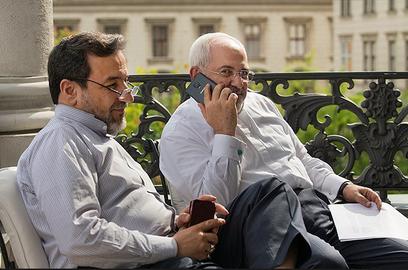The International Olympics Committee (IOC) has announced that Iranian and North Korean athletes will be given Samsung smartphones as part of their welcome pack to this year’s Olympic and Paralympic Games, reversing an earlier decision.
On February 7, news emerged that Samsung had donated 4,000 Galaxy Note8 mobile phones to the South Korean Olympics Committee but, due to United States’ sanctions against Iran and North Korea, athletes from those countries would not be eligible for the gift.
Iranian Foreign Minister Mohammad Javad Zarif threatened Samsung with a boycott and Iranians expressed outrage on Twitter and other social networks, claiming unfair treatment and discrimination.
The South Korean Yonhap News Agency originally reported: “Olympic organizers won't provide North Korean and Iranian players with Samsung smartphones, which are available free to all other athletes, for fear of violating international sanctions on the countries.”
Samsung is one of 13 key sponsors of the Winter Olympics and Paralympics Games, which will take place in the South Korean city of Pyeongchang from February 8 to 25.
An Associated Press report said: “Samsung has donated the smartphones so that athletes and the Olympics Committee officials can document every moment and share their memories with the world.” Athletes will be asked to send their photographs and videos to Samsung, which will then publish a selection of them.
Iran is a big market for Samsung, so after the news hit the headlines, many Iranians went on to Twitter advocating a boycott of Samsung products, using the hashtag #BanSamsung (#تحریم_سامسونگ in Persian). When Foreign Minister Zarif issued his threat of a boycott, he was most likely aware of the Twitter campaign.
It’s not the first time Samsung has faced boycotts in connection with sporting events. In 2002, Italians staged a boycott against Samsung following a botched ruling during the FIFA World Cup, which took place in South Korea and Japan. After a qualifying game between Italy and South Korea went into extra time, Ecuadorean referee Byron Moreno incorrectly ruled that a goal scored by Italy was offside, leading to a victory for South Korea. Furious, Italians boycotted South Korean products for three years, including Samsung. (The disgraced referee went on to be convicted on drug smuggling charges after being arrested at New York’s JFK International Airport for carrying 10 bags of heroin, a total of six kilograms worth €535,000. He spent two years in a US prison.)
At an official level, Iran deployed different tactics to protest against the Olympics Committee’s decision. Reza Salehi Amiri, head of Iran’s Olympics Committee, issued an order to buy smartphones for the Iranian athletes in an effort to console them and smooth over the matter. But the decision did not go over well with many Iranians on social networks, who regarded it as an acceptance of the decision and essentially backing down. “Besides the fact that we do not know how to deal with the humiliation conveyed by this news,” wrote sports commentator Afshin Khamand on his Telegram channel, “I must ask: Why are we giving to a company that, for whatever political reason, does not consider our athletes worthy of gifts?”
Iran Is not North Korea
Shahrokh Shahnazi, Secretary of Iran’s National Olympics Committee, announced on Thursday, February 8 that he had written two letters to the International Olympics Committee demanding an apology. “We are not in the same category as North Korea [and should not] be treated this way,” he said, calling the decision “un-Olympian.”
The Olympic Charter sets out that the rights and freedoms it espouses “shall be secured without discrimination of any kind, such as race, color, sex, sexual orientation, language, religion, political or other opinion, national or social origin, property, birth or other status.” [PDF] This charter cannot be changed and it overrides charters of all other Olympics committees, including the International Olympics Committee and its associated federations.
Following the news that Iranian and North Korean athletes would not be receiving the same welcome pack as other Olympic athletes, Zarif’s assistant, Mahmoud Farazandeh, summoned the South Korean ambassador to the Iranian Foreign Ministry to provide an explanation. The ambassador told him: “South Korean government officials and Samsung had no role in this misunderstanding and the distribution of gift items.”
Zarif announced that if the South Koreans did not reverse their decision, he would stop using his Samsung mobile. Salehi Amiri, head of Iran’s National Olympics Committee, praised Zarif for taking this position.
At the same time, the semi-official Fars News Agency announced that, until further notice, it would remove ads for Samsung products from its websites.
Iran’s Olympics Committee could have decided on a more formidable set of actions beyond praising the foreign minister and boycotting South Korean products. There is a precedent for this, though not an encouraging one. In winter 2017, Saudi Arabia announced that if the Asian Football Confederation forced Saudi teams to compete on Iranian soil, not only would it not participate in the Asian Champions League games, it would boycott all Asian football competitions. Iran fought back, but Saudi Arabia won.
Nevertheless, thousands of Iranians on social networks believed that Iran could have threatened to boycott the Winter Olympics instead of buying phones for the athletes or simply turning off their Samsung mobiles.
It now appears that the International Olympics Committee has reversed course. “The IOC will provide mobile phones to all athletes of all countries participating at the Pyeongchang 2018 Olympic and Paralympic Winter Grames. These phones contain essential logistical and competition information for the athletes,” an IOC spokesperson told Reuters, adding that Iranian athletes will be allowed to keep their phones, while North Koreans will be asked to return them after the games.
visit the accountability section
In this section of Iran Wire, you can contact the officials and launch your campaign for various problems


























comments